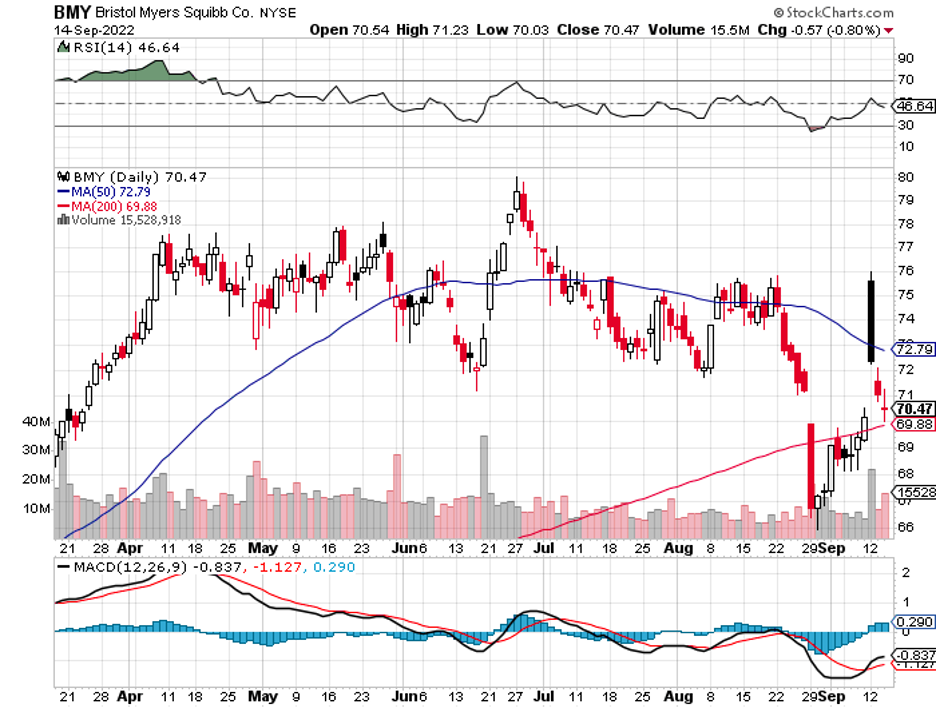A Monster Biotech On Its Way To Another Blockbuster
This year's bear market has pushed a lot of businesses to their breaking points. The S&P 500, the benchmark of stock performance in the US, has fallen by 14.6% in 2022.
What’s making things look gloomier is that the tech-focused Nasdaq Composite Index, aka the bellwether growth stock index, has plummeted by 22% thus far. Even the Dow Jones Industrial Average, another leading indicator, has dipped by 11.5%. All these firmly place the entire market in the bear market territory.
In response to the headwinds, investors have spotlighted businesses with steady free cash flow, solid leadership teams, and virtually recession-proof sectors.
This is where Bristol Myers Squibb (BMY) shines as an excellent example of Wall Street’s reinvigorated desire to pour money on long-forgotten movers in the market.
As one of the leading biotechnology companies worldwide, BMY has once again piqued the interest of investors primarily for its ability to defy the bear market. In fact, the company’s stock is up 12% year to date, clearly outperforming the S&P 500 by roughly 29 percentage points.
BMY’s ascent has taken years, with the business benefitting massively from its $74 billion acquisition of another biotech stalwart, Celgene.
This deal granted BMY access to an extensive oncology and autoimmune diseases portfolio, with back-to-back blockbusters like Revlimid and Reblozyl sales practically paying for Celgene’s acquisition price.
Now, BMY has made another move that brought seismic rearrangement within the biopharma sector, particularly in the highly lucrative psoriasis treatments space.
Earlier this month, BMY disclosed that it received FDA approval for its oral plaque psoriasis treatment deucravacitinib. The company plans to market this new drug under the name Sotyktu.
More impressively, Sotyktu was not given any “black-boxed warning” on its label, which typically indicates that a treatment carries significant safety risks.
Unlike most therapies for psoriasis, which use Janus kinase inhibitors, BMY is the first to use and gain approval for a TYK2 inhibitor. Generally, treatments utilizing Janus kinase inhibitors come with “black-boxed warnings.”
The absence of which, in BMY’s candidate, indicates a cleaner label.
This is terrible news for Amgen’s (AMGN) Otezla, which is currently the leader in the psoriasis space. Since this drug uses Janus kinase inhibitors, it has become a “less safe” option for patients. More than that, Sotyktu managed to outperform Otezla in a head-to-head trial.
Aside from that, a “black-boxed warning” would have offered Amgen some defense in protecting Otezla’s market share.
Meanwhile, Sotyktu’s approval brings good news to smaller biotechnology companies, such as Ventyx Biosciences (VTYX), working on similar treatments that use TYK2 inhibitors.
Regarding costs, BMY’s list price for its psoriasis therapy is notably higher than Amgen’s. According to sources, Sotyktu will be given a price tag of roughly $75,000. In comparison, Otezla is priced at approximately $52,000 annually.
Needless to say, Sotyktu is projected to become another blockbuster in BMY’s arsenal. Simply basing the possibilities on Otezla’s recent sales reports would give us a good picture of this new drug’s future.
In 2021, Otezla raked in $2.2 billion in sales for Amgen. Despite the competition, Otezla is still projected to grow and reach $3.2 billion in annual sales by 2026.
Considering that BMY’s Sotyktu will be playing catch up in terms of marketing and distribution, this psoriasis drug is anticipated to reach $2 billion in yearly sales in 2026.
However, this was estimated before the FDA’s surprise approval. The consensus is that the absence of a “black-boxed warning” would significantly boost the projections.
Overall, BMY has always been quite the oddball among its peers. While the SPDR S&P Biotech ETF rose by a staggering 42% in 2021, the company was barely in positive territory.
Due to the impending patent cliffs at that time, BMY was considered a laggard in the biopharma world. Added to those concerns was the company’s move to buy Celgene for a jaw-dropping $74 billion, substantially increasing its debt-to-equity-ratio. Taken together, these threats made BMY an unfavorable investment from 2020 to late 2021.
By 2022, however, BMY will have transformed into a favorite on Wall Street. Investors have regarded it as a safe harbor amid the ongoing bear market.
Moreover, BMY shares have marched even higher thus far by an impressive 12.5%. Meanwhile, the SPDR S&P Biotech ETF has recorded a 21.4% loss this year.
While the rest of the market has been struggling to keep things afloat, BMY’s stock isn’t that far from hitting its 52-week high to date. Hence, it would be an excellent move to buy the dip.

